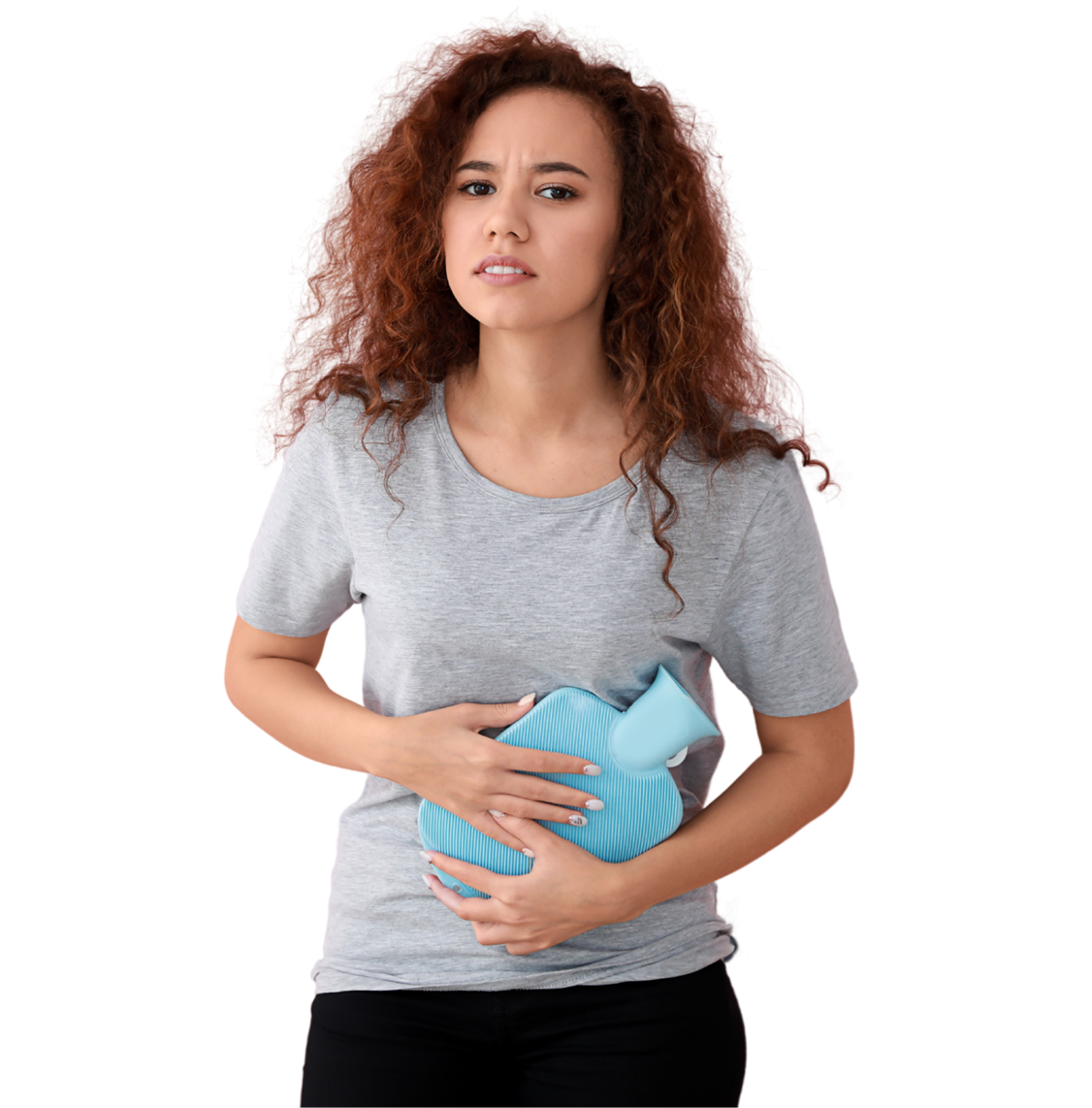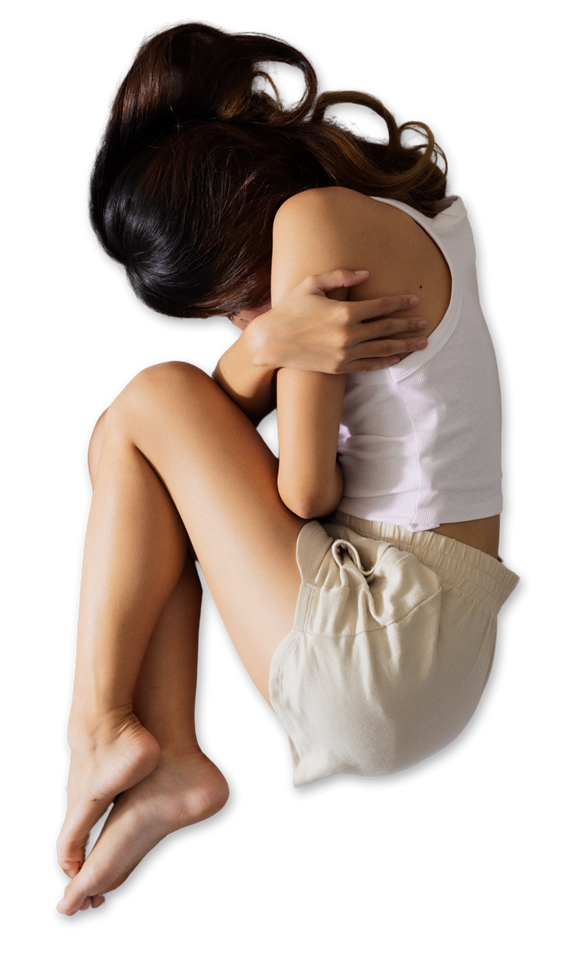Acupuncture for Menstrual Cramps
You may have been told that PMS is “just part of being a woman”, however experiencing severe symptoms before menstruation is not normal and often signals underlying imbalances in the body.


PMS is a real pain in the uterus!
It’s so much more than just cramps.
Pre-Menstrual Syndrome symptoms include:
- Joint and muscle pain
- Headaches
- Fatigue
- Fluid retention
- Acne flare ups
- Breast tenderness
- Anxiety
- Constipation or diarrhea
- Poor concentration
- Crying spells
- Irritability or anger
- Depressed mood
- Insomnia
- Cravings for sweets and food in general
There are many ways you can take control of your menstrual cycle with nutrition and acupuncture, resulting in:
- More consistent cycles
- Smoother transitions from phase to phase
- Less PMS symptoms
- More energy and better mood during menstruation
Let's get started!
HOW WE CAN HELP
Acupuncture for Menstrual Cramps and PMS in Toronto and the GTA
Get to know your cycle!
Menstruation, Day 1-7:
It’s easy to know when your cycle begins because Day 1 is the day you get your period. This typically lasts 4-7 days.
The Follicular Phase, Day 1-14:
This phase overlaps with the menstruation phase. It begins when your period starts and ends when you ovulate. During this phase, your estrogen levels increase and the lining of the uterus thickens. In your ovaries, the follicles begin to develop. By the end of the follicular phase, a mature egg will be formed.
Ovulation, Day 14:
This occurs approximately at Day 14 in the cycle. An increase in luteinizing hormone causes your ovaries to release the follicle.
Luteinizing Phase, Day 15-28:
The last phase of the menstrual cycle is when the egg travels through the fallopian tube to the uterus. During this phase, progesterone levels increase. If the egg becomes fertilized, then it attaches to the lining of the uterus. If not, then estrogen and progesterone levels drop, the uterine lining sheds, and the cycle begins again.
Go with the flow:
It’s normal to have fluctuations in energy levels during your cycle. The drop in estrogen and progesterone at the beginning of your period may cause low energy. So, you may need some extra sleep those first couple of days of the cycle. However, you will notice an increase in energy and mood during the follicular phase.
Here’s how Essential balance can help reduce / eliminate your PMS symptoms:
Acupuncture for menstrual cramps can help:
- Regulate hormones: Acupuncture helps balance the endocrine (hormonal) system, to stabilize hormone levels and reduce symptoms such as facial acne, irritability, anxiety and mood swings.
- Improve blood flow: By enhancing blood circulation, acupuncture can alleviate physical symptoms such as bloating and breast tenderness.
- Reduce stress: Acupuncture promotes relaxation and reduces stress hormone level (especially cortisol), which will mitigate anxiety and the emotional distress associated with PMS.
- Alleviate pain: Many women experience cramps and headaches prior to the start of their cycle. Acupuncture has analgesic properties that can effectively relieve these pains.
- Enhance sleep quality: Better sleep patterns significantly strengthen the immune system, reduce fatigue and improve one’s overall wellbeing, which are often disrupted prior to the start of your cycle.
- Reduce/eliminate cravings: Often an irrational increase in appetite and desire for sweets occurs prior to the start of your menstrual cycle. Acupuncture can dramatically reduce or eliminate your cravings.
We can also help with an often overlooked but more extreme form of pre-menstrual syndrome referred to as pre-menstrual dysphoric disorder. PMDD can cause depression and severe mood swings 1-2 weeks prior to menstruation.
Ready to Get Started?
Click to book your acupuncture session for menstrual pain and PMS relief.
Have questions? Arrange for a No-cost 10-minute Discovery Call and speak directly with Eileen to learn more.
Nutrition for PMS in Toronto and the GTA
Managing PMS/PMDD is not just about estrogen and progesterone. It's also about:
Serotonin: A hormone responsible for mood and sleep. High estrogen levels often associated with PMS can interfere with serotonin which may contribute to mood changes prior to your period.
Cortisol: Our stress hormone can interfere with progesterone levels and the delicate balance between progesterone and estrogen. If you have high levels of cortisol due to stress, this may make PMS/PMDD symptoms worse.
Histamine: High histamine the body may worsen PMS/PMDD symptoms by further interfering with serotonin levels as well as increasing contractions in the uterus. High histamine levels are related to poor gut health and general inflammation.
At Essential Balance our comprehensive Nutrition Support for menstrual cramps and PMS includes:
- A hormone balancing diet
- How to balance cortisol and why it affects your menstrual cycle
- Foods to support different phases of your cycle
- Herbal remedies to reduce menstrual pain and other PMS symptoms
- Vitamin and mineral supplements to support menstruation and the body as a whole
Nutrition Consulting
Click to book your nutrition session for menstrual pain and PMS support.
Have questions? Book a Free 10-minute Discovery Call with Kirsten or Eileen and get your questions answered!
Your Questions Answered
Studies have shown that regular acupuncture treatments can help with both the psychological and physiological symptoms related to PMS.
Acupuncture and acupressure for premenstrual syndrome - PubMed (nih.gov)
Women who incorporate acupuncture into their health regimen often report significant improvements in their PMS symptoms; specific benefits can include:
- Emotional stability: Women find that acupuncture helps stabilize their mood, reducing irritability, anxiety, and depression.
- Physical relief: Symptoms such as cramps, bloating, and headaches become less severe or are eliminated completely.
- Increased focus and energy: Improved sleep and reduced fatigue help women focus better and feel more energetic.
- Overall wellbeing: Regular acupuncture treatments support overall health, making it easier to maintain a balanced and more predictable level of health and vitality.
Acupuncture for primary dysmenorrhoea: a systematic review - PubMed (nih.gov)
A Case Study of Amenorrhea Treated with Acupuncture (acamjournal.com)
Premenstrual Syndrome Is Associated with Dietary and Lifestyle Behaviors among University Students: A Cross-Sectional Study from Sharjah, UAE - PMC (nih.gov)
Impact of nutritional diet therapy on premenstrual syndrome - PubMed (nih.gov)
Yes, absolutely! Acupuncture can help with:
- PMDD (Pre-Menstrual Dysphoric Disorder): Often referred to as a more severe form of PMS; symptoms include feelings of worthlessness, depressed mood, self-deprecating thoughts, fatigue, sleep problems, and interpersonal conflict.
- PCOS – Polycystic Ovarian Syndrome: Please read more about how we can help with PCOS.
- Dysmenorrhea: Also known as irregular cycles.
- Amenorrhea: This is the absence of your menstrual cycle; defined as having missed a few cycles and you are not pregnant.


